Abstract
STUDY OBJECTIVE--The aim was to examine social and physical correlates of blood pressure in 15 year olds. DESIGN--This was the first, baseline, sweep of a longitudinal survey of 15 year olds based on a two stage stratified clustered random sample. SETTING--The Central Clydeside Conurbation, in the West of Scotland. In 1981 this had a population of 1.7 million and a standardised mortality ratio (relative to Scotland as a whole) of 109. SUBJECTS--A random sample of households containing 15 year olds were approached by Strathclyde Regional Council; 70% agreed to have their names passed on to the MRC (15% refused, 10% could not be contacted, and 5% had moved). Of these 1177, 11% refused to participate, 3% were not contactable/had moved, and 4% did not provide full data. Complete blood pressure data are available for 959 15 year olds (464 males and 495 females). MEASUREMENTS AND MAIN RESULTS--Blood pressure, pulse rate, height, weight, and room temperature were measured by nurses in the subjects' homes. Smoking, drinking, and frequency of vigorous exercise were self reported. Maternal height, birthweight, occupation of head of household, and housing tenure were reported by parents. After controlling for the other variables, systolic blood pressure was significantly associated with weight, pulse rate, and room temperature in males and with weight, pulse rate, housing tenure, smoking, and exercise in females. Diastolic blood pressure was associated with room temperature in males and with mother's height, pulse rate, and housing tenure in females. Controlling for current weight, birthweight was inversely related to systolic blood pressure in males and positively associated in females, though in neither case were these associations statistically significant. CONCLUSIONS--In males, blood pressure was mainly related to anthropometric factors whereas in females it was additionally related to socioeconomic and behavioural variables. Although not reaching significance, the weight standardised relationship between birthweight and systolic blood pressure was consistent for males, but not females, with those reported by recent British studies of children and adults. The longitudinal design of this study will allow us to examine correlates of blood pressure in the same individuals as they reach social and physical maturity.
Full text
PDF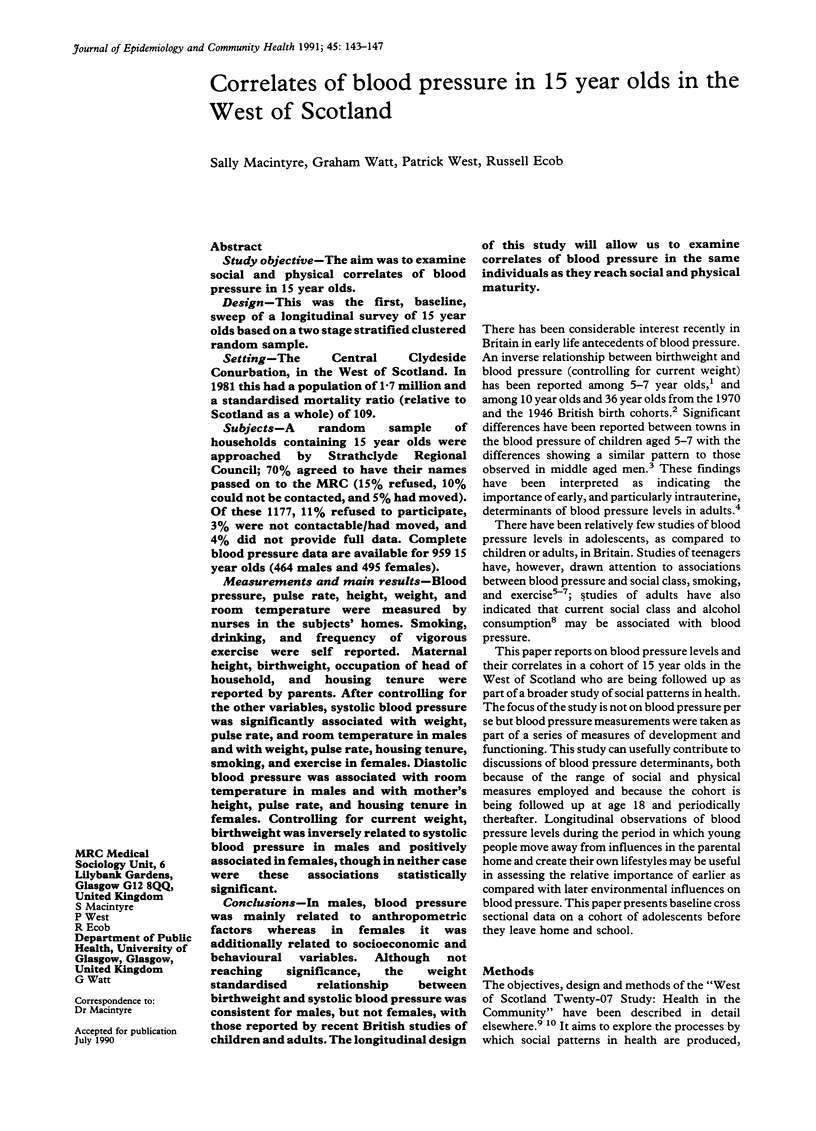
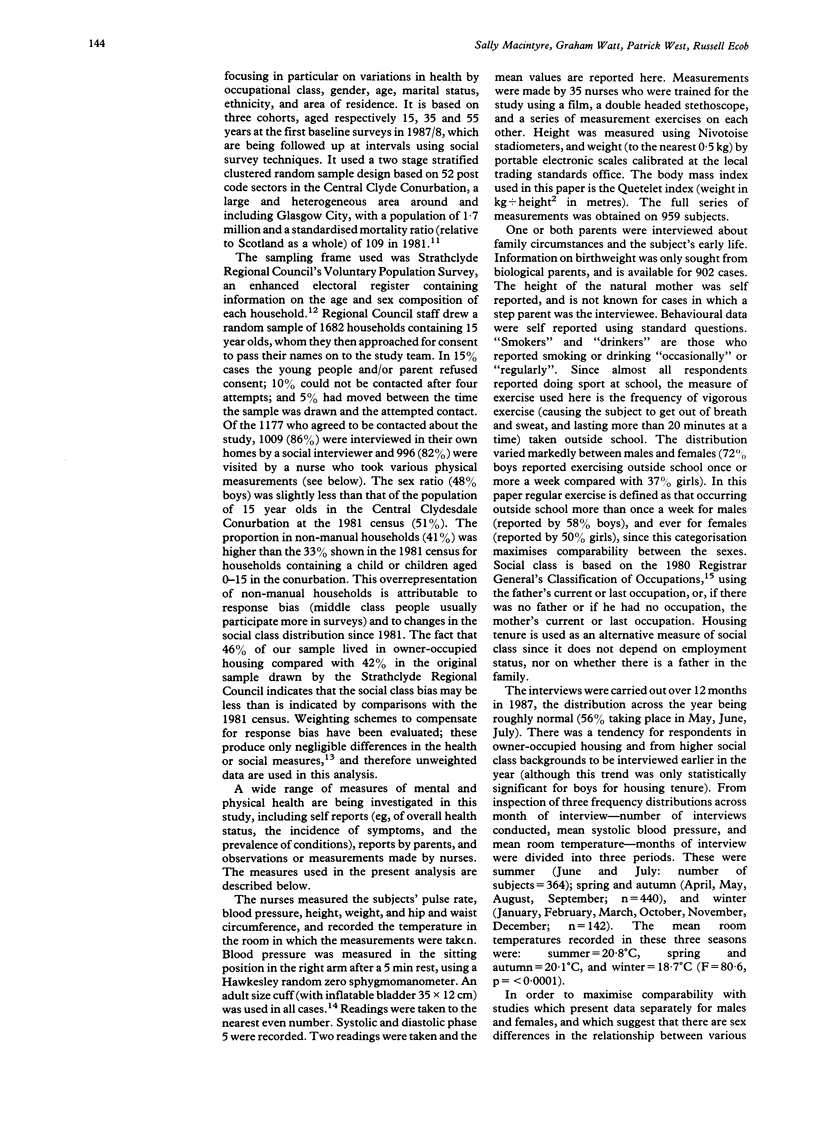
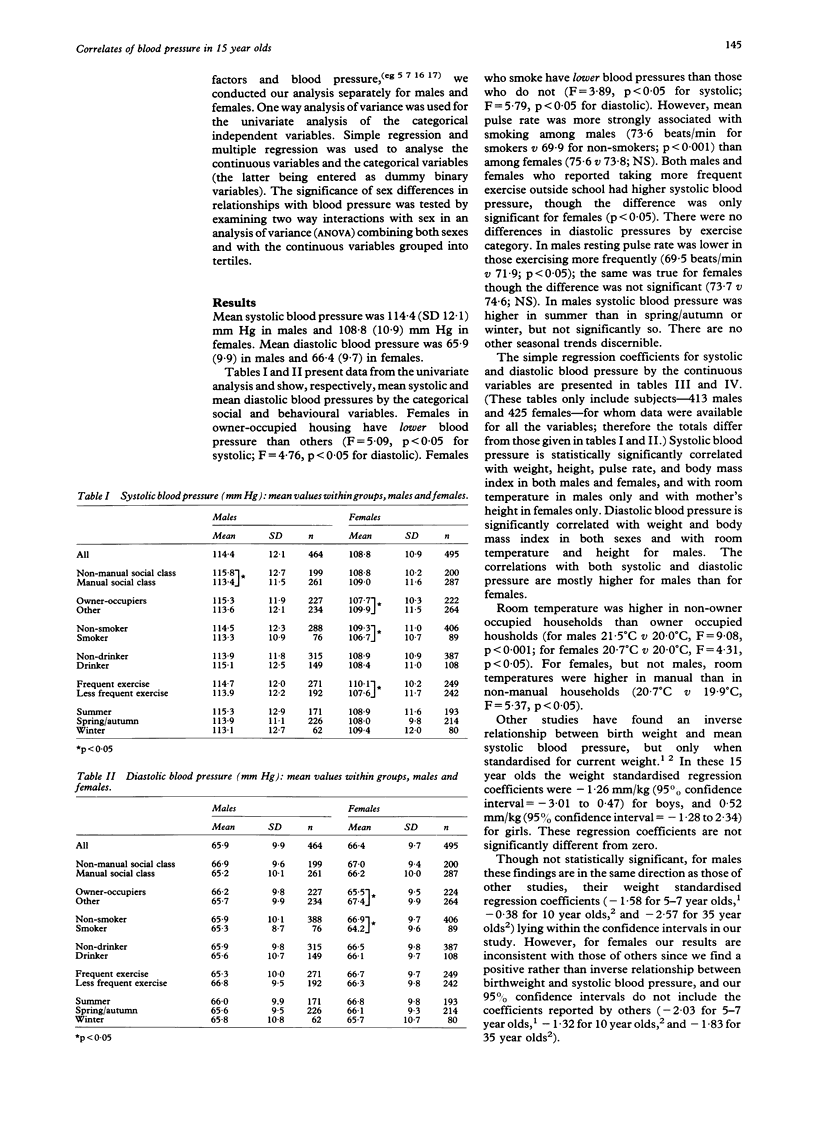
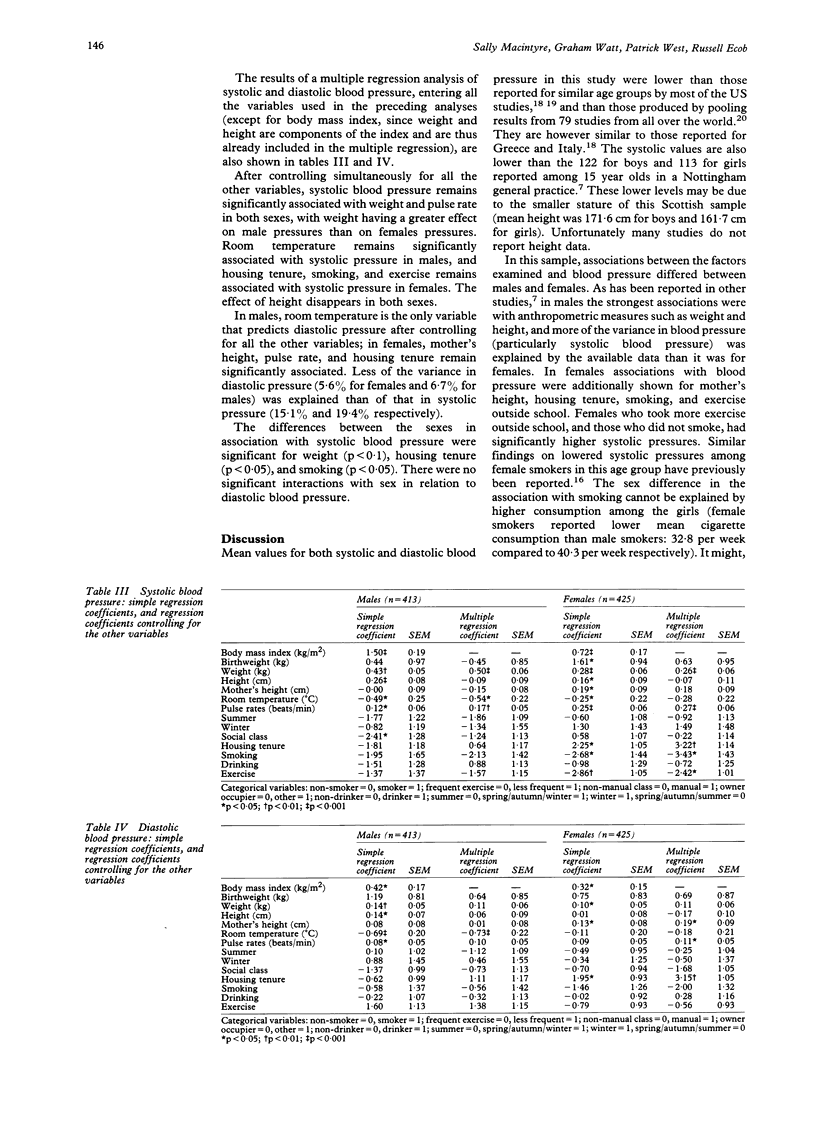
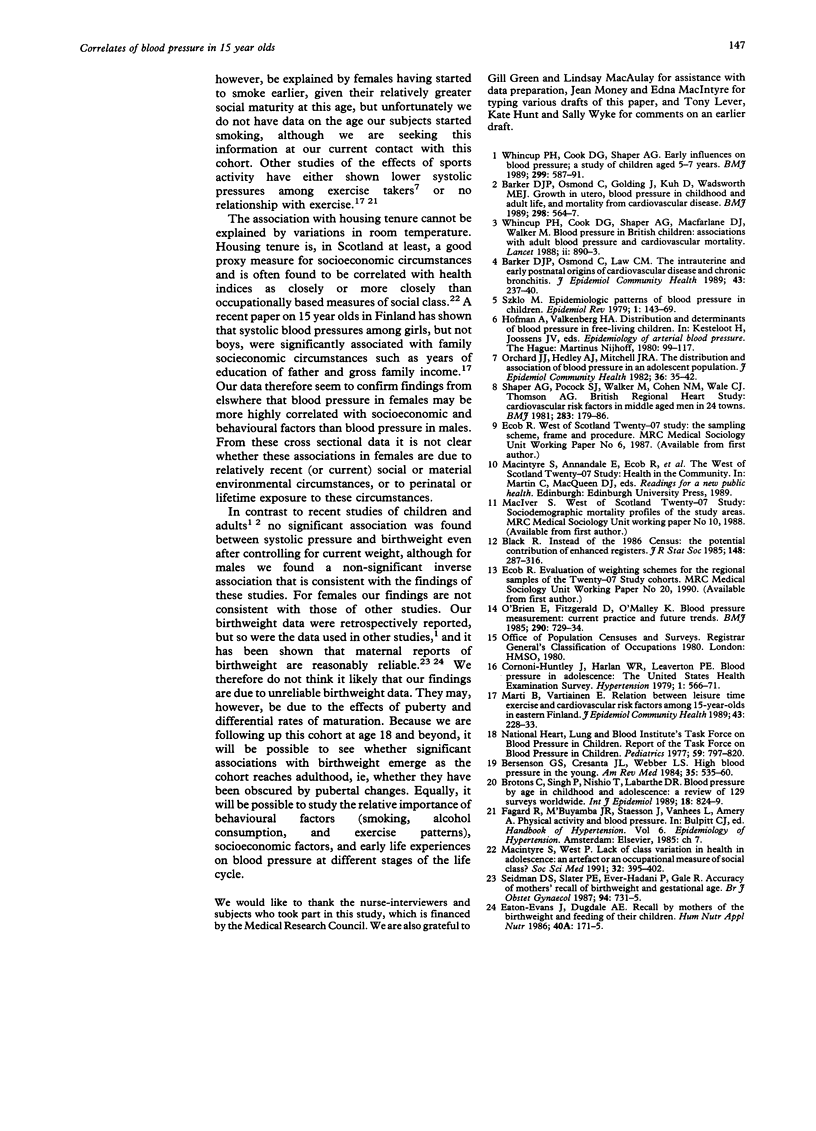
Selected References
These references are in PubMed. This may not be the complete list of references from this article.
- Barker D. J., Osmond C., Golding J., Kuh D., Wadsworth M. E. Growth in utero, blood pressure in childhood and adult life, and mortality from cardiovascular disease. BMJ. 1989 Mar 4;298(6673):564–567. doi: 10.1136/bmj.298.6673.564. [DOI] [PMC free article] [PubMed] [Google Scholar]
- Barker D. J., Osmond C., Law C. M. The intrauterine and early postnatal origins of cardiovascular disease and chronic bronchitis. J Epidemiol Community Health. 1989 Sep;43(3):237–240. doi: 10.1136/jech.43.3.237. [DOI] [PMC free article] [PubMed] [Google Scholar]
- Berenson G. S., Cresanta J. L., Webber L. S. High blood pressure in the young. Annu Rev Med. 1984;35:535–560. doi: 10.1146/annurev.me.35.020184.002535. [DOI] [PubMed] [Google Scholar]
- Brotons C., Singh P., Nishio T., Labarthe D. R. Blood pressure by age in childhood and adolescence: a review of 129 surveys worldwide. Int J Epidemiol. 1989 Dec;18(4):824–829. doi: 10.1093/ije/18.4.824. [DOI] [PubMed] [Google Scholar]
- Cornoni-Huntley J., Harlan W. R., Leaverton P. E. Blood pressure in adolescence. The United States Health Examination survey. Hypertension. 1979 Nov-Dec;1(6):566–571. doi: 10.1161/01.hyp.1.6.566. [DOI] [PubMed] [Google Scholar]
- Eaton-Evans J., Dugdale A. E. Recall by mothers of the birth weights and feeding of their children. Hum Nutr Appl Nutr. 1986 Jun;40(3):171–175. [PubMed] [Google Scholar]
- Macintyre S., West P. Lack of class variation in health in adolescence: an artefact of an occupational measure of social class? Soc Sci Med. 1991;32(4):395–402. doi: 10.1016/0277-9536(91)90340-i. [DOI] [PubMed] [Google Scholar]
- Marti B., Vartiainen E. Relation between leisure time exercise and cardiovascular risk factors among 15-year-olds in eastern Finland. J Epidemiol Community Health. 1989 Sep;43(3):228–233. doi: 10.1136/jech.43.3.228. [DOI] [PMC free article] [PubMed] [Google Scholar]
- O'Brien E., Fitzgerald D., O'Malley K. Blood pressure measurement: current practice and future trends. Br Med J (Clin Res Ed) 1985 Mar 9;290(6470):729–734. doi: 10.1136/bmj.290.6470.729. [DOI] [PMC free article] [PubMed] [Google Scholar]
- Orchard T. J., Hedley A. J., Mitchell J. R. The distribution and associations of blood pressure in an adolescent population. J Epidemiol Community Health. 1982 Mar;36(1):35–42. doi: 10.1136/jech.36.1.35. [DOI] [PMC free article] [PubMed] [Google Scholar]
- Seidman D. S., Slater P. E., Ever-Hadani P., Gale R. Accuracy of mothers' recall of birthweight and gestational age. Br J Obstet Gynaecol. 1987 Aug;94(8):731–735. doi: 10.1111/j.1471-0528.1987.tb03717.x. [DOI] [PubMed] [Google Scholar]
- Shaper A. G., Pocock S. J., Walker M., Cohen N. M., Wale C. J., Thomson A. G. British Regional Heart Study: cardiovascular risk factors in middle-aged men in 24 towns. Br Med J (Clin Res Ed) 1981 Jul 18;283(6285):179–186. doi: 10.1136/bmj.283.6285.179. [DOI] [PMC free article] [PubMed] [Google Scholar]
- Szklo M. Epidemiologic patterns of blood pressure in children. Epidemiol Rev. 1979;1:143–169. doi: 10.1093/oxfordjournals.epirev.a036207. [DOI] [PubMed] [Google Scholar]
- Whincup P. H., Cook D. G., Shaper A. G. Early influences on blood pressure: a study of children aged 5-7 years. BMJ. 1989 Sep 2;299(6699):587–591. doi: 10.1136/bmj.299.6699.587. [DOI] [PMC free article] [PubMed] [Google Scholar]
- Whincup P. H., Cook D. G., Shaper A. G., Macfarlane D. J., Walker M. Blood pressure in British children: associations with adult blood pressure and cardiovascular mortality. Lancet. 1988 Oct 15;2(8616):890–893. doi: 10.1016/s0140-6736(88)92481-6. [DOI] [PubMed] [Google Scholar]


